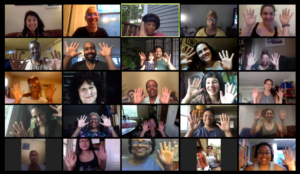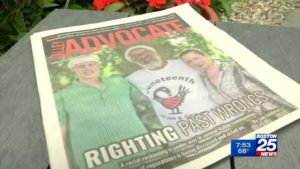When Black women are harmed by Black men, they often feel caught between their desire for justice and not wanting to prove any racist stereotypes true.
“On the Record,” the HBO Max documentary on sexual assault allegations against the hip-hop titan Russell Simmons, does more than simply lay out the harrowing account of former music executive Drew Dixon and several other accusers, which Simmons has denied. Using other historical cases as well as the broader context for how often Black men were and are falsely accused by white women, it asks viewers to consider one heart-wrenching question: When will we stop expecting Black women to choose “the culture” over their own safety and well being?
Directed by the Oscar-nominated duo Amy Ziering and Kirby Dick, the film premiered at the Sundance Film Festival in January; Ziering and Dick have made other several critically acclaimed documentaries about sexual assault, including “The Hunting Ground” and “The Invisible War.” Their approach with “On the Record” brings the same kind of depth and compassion to Dixon’s story and, perhaps more importantly, uses the directors’ knowledge to contextualize how her allegations have had different reverberations both for her personally and within her community.
What complicated Dixon’s coming forward to share her story sooner was her — and the world’s — relationship with hip-hop. Simmons co-founded the legendary label Def Jam, which brought artists like Run-DMC, LL Cool J and the Beastie Boys to the mainstream; he stood at the epicenter of all hip-hop and as Dixon astutely states in the film: “You stand in solidarity with the movement as a Black woman; you don’t parse the sexism within the movement as a Black woman.”
She believed that telling her account of what she said happened with Simmons in 1995 would have made “the Black community hate my guts,” and so she kept silent.
“I wanted Russell to be a hero, too,” she says. “For 22 years, I took it for the team,” she adds. “I didn’t want to let the culture down. I love the culture. … I loved Russell too.”
As author and scholar Joan Morgan observes in the film, Black women often allow race loyalty “to buy them an early tombstone.” Dixon’s conflict is one many women grapple with when it comes to confronting Black men as perpetrators of sexual misconduct against Black women.
Part of the issue is that the stereotypes of Black men as sexually aggressive predators date all the way to slavery, and white supremacy does everything in its power to uphold them. “On the Record” highlights, for instance, the 1955 brutal murder of the teenage Emmett Till at the hands of a mob of white men for allegedly whistling at a white woman (who later admitted she lied) to cement how dangerous this myth is to Black men. Thus, when it comes to Black men and actual sexual assault, there is a hypersensitivity around the subject in Black communities that often prioritizes the protection of their lives and legacies over justice for their victims.
To demonstrate that, “On the Record” covers the sexual harassment and assault allegations against now-Supreme Court Justice Clarence Thomas by his former subordinate Anita Hill and against boxer Mike Tyson by Desiree Washington, respectively. Thomas, who had been Hill’s boss at the Department of Education and then the Equal Employment Opportunity Commission, referred to his 1991 Senate confirmation hearings into her allegations as a “high-tech lynching”; he was confirmed just two days after they were finished. And, although Tyson was convicted of raping Washington after a trial in which he testified, poorly, on his own behalf, he served less than three years of a six-year sentence and later had quite a comeback in the sports world.
Both Hill and Washington were — and still are — routinely accused of trying to smear established Black men. Barbara Walters’ 1992 “20/20” interview with Washington (a clip of which was featured in “On the Record”) was more of an interrogation than an interview; Erinn Cosby, who had also accused Tyson of attempted assault, suffered much the same fate when she came forward on “The Donahue Show” that same year.
There are, of course, more examples to cite of Black men accused of assaulting Black women with far too few consequences.
Nearly 60 women had to come forward, many of whom were Black, for Bill Cosby to be tried and eventually convicted of one sexual assault, though the accusations spanned nearly 50 years. But even as the strikingly similar accusations mounted, celebrities came to his defense, including Kanye West and Whoopi Goldberg (who later recanted her defense). Even some of his “Cosby Show” co-stars insisted he was a victim of racism, which was being magnified by his celebrity status and cultural contributions.
And for R. Kelly to finally face any charges for his alleged crimes, scores of young Black girls had to come forward for decades, including in last year’s “Surviving R. Kelly” series. Kelly’s abuse of teenagers had been an open secret in the music industry for years, but because his victims were often low-income Black girls — a group that nobody cares about or wants to protect — they were often blamed (and even labeled as “fast” or promiscuous) for his allegedly predatory behavior.
And, of course, after the passing of Kobe Bryant in February, Gayle King found herself at the center of controversy when, during an interview with WNBA star Lisa Leslie, King asked her if the 2003 rape charges against Bryant — for which he apologized to the victim — complicated how he will be remembered. King received weeks of harassment, including from other Black celebrities, for daring to point out that Bryant’s actions might influence how he would be remembered.
The documentary itself may be suffering from the very problem Dixon was concerned about: Although Oprah Winfrey had signed on as executive producer, she pulled her support from the film (taking with her the film’s Apple TV+ distribution deal) just weeks before its Sundance debut. Though she claimed there was “more work to be done on the film to illuminate the full scope of what the victims endured,” many believed that Simmons’ open letter to Winfrey — posted on Instagram in December — was enough public pressure for her to end any involvement. (Winfrey had also faced significant backlash for siding with and offering a platform to Michael Jackson’s accusers last year, in an hour-long interview special “After Neverland.”)
All of this suggests that Dixon wasn’t wrong: There may never be a “good” time to talk about her assault, since it involved a beloved Black man.
“On the Record, ” at least, gives Black women the opportunity and space to unpack the complexity of being victimized by Black men, and wanting to protect Black men from a white supremacist stereotype that has resulted in heinous violence being perpetrated against them, from both personal and societal perspectives. It doesn’t resolve Dixon’s — or anyone else’s — fundamental conundrum, but it allows that conundrum to be aired out, for once, without victim-blaming.




